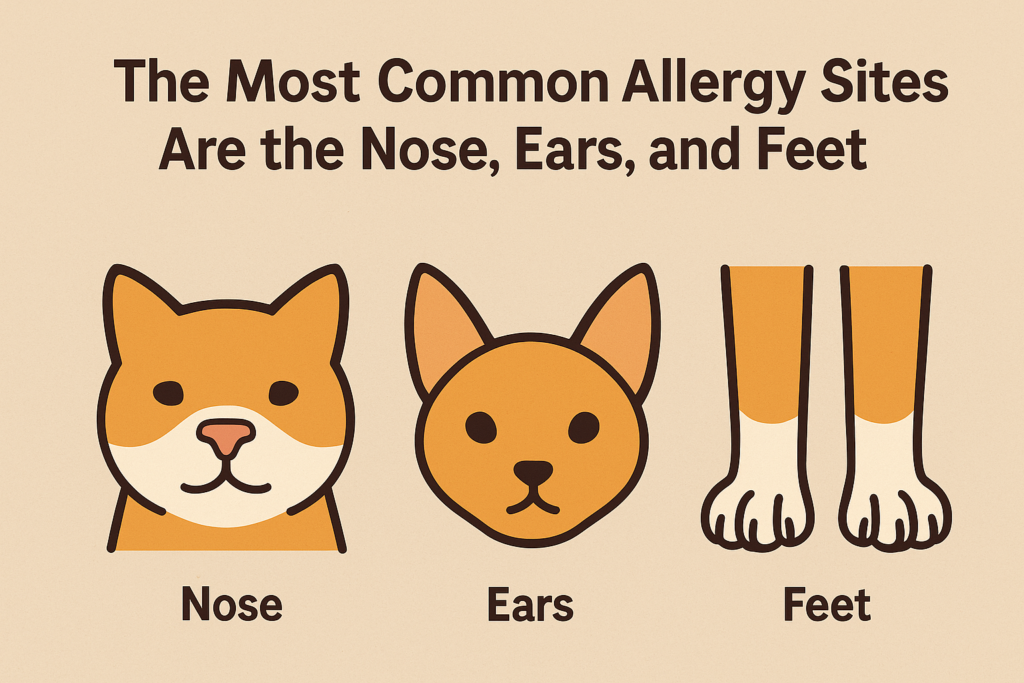Introduction
Many pet owners are surprised to learn that cats, like humans, can suffer from mosquito allergies. If your cat seems irritated during mosquito season or develops strange bumps on its skin, it may be more than a bug bite — it could be a sign of cat mosquito allergy. This condition, also known as mosquito bite hypersensitivity in cats, can cause discomfort, skin lesions, and even serious allergic reactions.
In this article, we’ll explore 10 essential facts about cat mosquito allergy, including treatment options, prevention methods, and how to spot early signs. If you’re wondering whether your cat is allergic to mosquito bites, this guide is for you.
1. Yes, Cats Can Be Allergic to Mosquito Bites

While it may seem unusual, cat mosquito allergy is a real condition. Just like humans, cats can have an overactive immune response to mosquito saliva. The result? Itchy welts, swelling, hair loss, and excessive scratching — often leading to infections.
According to veterinarians, mosquito bite hypersensitivity in cats is more common in certain breeds and outdoor cats exposed to mosquito-prone environments. However, any cat can be affected.
2. Mosquito Bite Hypersensitivity in Cats Is More Than Just Itching
For some cats, mosquito bites cause only mild irritation. But in allergic cats, even one bite can trigger severe symptoms. Here’s what to watch for:
- Raised red bumps or lesions, often on the nose, ears, or paws
- Hair loss around the affected area
- Scabs or ulcers caused by constant scratching or licking
- Swelling of the face or limbs
- Restlessness or behavioral changes
These symptoms are typically signs of mosquito bite hypersensitivity, an allergic condition that worsens with repeated exposure.
3. Indoor Cats Aren’t Completely Safe Either
Think your indoor cat is safe? Think again. Mosquitoes can enter your home through:
- Open windows without screens
- Poorly sealed doors
- Standing water near entry points
- Your own clothing or pet’s fur
Cats that live near water or in humid environments are especially at risk. Even one mosquito inside your house can be enough to trigger a cat mosquito allergy episode.
4. The Most Common Allergy Sites Are the Nose, Ears, and Feet

Cat mosquito allergy symptoms typically appear in areas with less fur and thinner skin. These include:
- Nose and muzzle
- Ear tips and outer ears
- Paw pads and legs
- Belly or inner thighs
This happens because mosquitoes naturally go for exposed skin. If you notice unusual scratching or scabs in these areas, mosquito bite hypersensitivity could be the cause.
5. How to Differentiate Mosquito Allergy From Other Skin Problems
It’s easy to confuse a cat mosquito allergy with other skin issues like:
- Flea allergies
- Miliary dermatitis
- Fungal infections
- Food allergies
Key differences include the seasonal pattern (usually during summer), and the location of the lesions — particularly on the nose and ears. However, it’s best to get a veterinary diagnosis to rule out other causes.
6. A Veterinary Diagnosis Is Crucial
If you suspect your cat is suffering from a mosquito allergy, don’t guess — visit your vet. A thorough examination may include:
- Skin scrapings or biopsies
- Blood tests to rule out infections or other allergens
- Observing your cat’s living environment and habits
Your vet may diagnose mosquito bite hypersensitivity based on your cat’s symptoms and history of exposure. Early detection helps prevent complications and improves your pet’s quality of life.
7. Cat Mosquito Allergy Treatment Involves Multiple Approaches
There is no single cure for cat mosquito allergy, but there are several treatment options:
- Topical corticosteroids: To reduce inflammation and itching
- Oral antihistamines: Depending on your vet’s advice
- Antibiotics: If there are secondary infections from scratching
- Medicated shampoos: To soothe irritated skin
Some cases may require immunotherapy (allergy shots), especially for severe or recurring reactions.
🟢 Tip: Never give your cat over-the-counter allergy meds without consulting your vet. Some human medications are toxic to pets.
8. Prevention Is Key to Managing Mosquito Bite Hypersensitivity
The best way to treat cat mosquito allergy is to prevent mosquito bites altogether. Here’s how:
- Use cat-safe mosquito repellents (ask your vet for recommendations)
- Install window and door screens
- Eliminate standing water sources around your home
- Keep your cat indoors during dawn and dusk when mosquitoes are most active
There are also natural repellents like lemon eucalyptus oil or neem, but always check if they are safe for feline use before applying.
9. Environmental Management Strategies to Protect Your Cat
When it comes to cat mosquito allergy, prevention is as important as treatment. Managing the environment where your cat lives—especially if they enjoy indoor/outdoor freedom—is crucial to avoid repeated allergic reactions.
1. Seal Entry Points
Ensure your home is mosquito-proof by sealing entry points:
- Install or repair window and door screens.
- Use weather stripping to close gaps under doors.
- Keep garage doors closed when not in use.
Even one mosquito can trigger mosquito bite hypersensitivity in sensitive cats.
2. Eliminate Standing Water
Mosquitoes breed in standing water. Check and remove:
- Plant saucers
- Pet water bowls left outside
- Clogged gutters
- Birdbaths and kiddie pools
💡 Tip: Replace outdoor water bowls daily or bring them inside.
3. Time Outdoor Activity Wisely
Mosquitoes are most active during dawn and dusk. If your cat likes to explore outdoors, supervise and limit their outdoor time during these peak hours. Indoor cats should also be kept away from open doors or windows during this time.
4. Use Pet-Safe Mosquito Deterrents
Cat mosquito allergy treatment doesn’t just include medication—it also includes prevention through mosquito deterrents. Avoid DEET-based products as they are toxic to cats. Instead:
- Use essential oil diffusers with cat-safe oils like cedarwood or lemongrass (only in well-ventilated areas).
- Try mosquito-repelling plants like catnip, lavender, and marigold in your garden or window boxes.
- Ask your vet about feline-safe topical repellents.
🚫 Never apply essential oils or human mosquito repellents directly to your cat.
10. Natural and Holistic Approaches to Cat Mosquito Allergy
Some pet parents prefer to support their cat’s immune response and overall wellness using natural remedies and holistic methods. While these aren’t replacements for veterinary care, they can complement your cat mosquito allergy treatment plan.
1. Omega-3 and Omega-6 Fatty Acids
Essential fatty acids are known to:
- Reduce inflammation
- Improve skin health
- Strengthen the immune system
You can add omega oils to your cat’s food via:
- Fish oil capsules (choose cat-specific formulas)
- Flaxseed oil (in moderation)
2. Quercetin – Nature’s Antihistamine
Quercetin is a flavonoid found in fruits and vegetables. It’s often referred to as “nature’s Benadryl” because it:
- Acts as a natural antihistamine
- Helps reduce allergic reactions
Before supplementing with quercetin, consult your vet to ensure the right dosage and safety for cats.
3. Calendula and Chamomile Soothing Rinses
If your cat has a mosquito bite reaction:
- Brew a weak tea with calendula or chamomile.
- Let it cool completely.
- Dab gently on the affected area with a cotton pad.
These herbs soothe irritation and reduce itchiness—but avoid overuse, and never let your cat ingest large amounts.
4. Strengthen Gut Health with Probiotics
A healthy gut helps regulate the immune system. Choose a cat-formulated probiotic to support long-term wellness and resistance to allergies, including mosquito bite hypersensitivity in cats.
Conclusion: Don’t Ignore the Signs
A cat mosquito allergy isn’t just a harmless skin reaction—it can lead to extreme discomfort, infections, and chronic inflammation if untreated. Knowing the signs of mosquito bite hypersensitivity in cats—like crusty ears, hair loss, and aggressive scratching—can help you act fast.
Treatment options vary based on severity, but may include:
- Veterinary-prescribed antihistamines or corticosteroids
- Topical treatments for inflammation
- Environmental mosquito control
- Natural supplements and diet changes
Most importantly, talk to your vet before beginning any cat mosquito allergy treatment at home. Cats react uniquely to medications and supplements, and safety is always the top priority.
Additional Resources
- American Veterinary Medical Association – Spring Pet Wellness Campaign launched
- Centers for Disease Control and Prevention – Protecting Pets from Mosquitoes




I am not positive where you’re getting your info, however great topic. I needs to spend a while finding out more or figuring out more. Thanks for wonderful info I used to be on the lookout for this information for my mission.